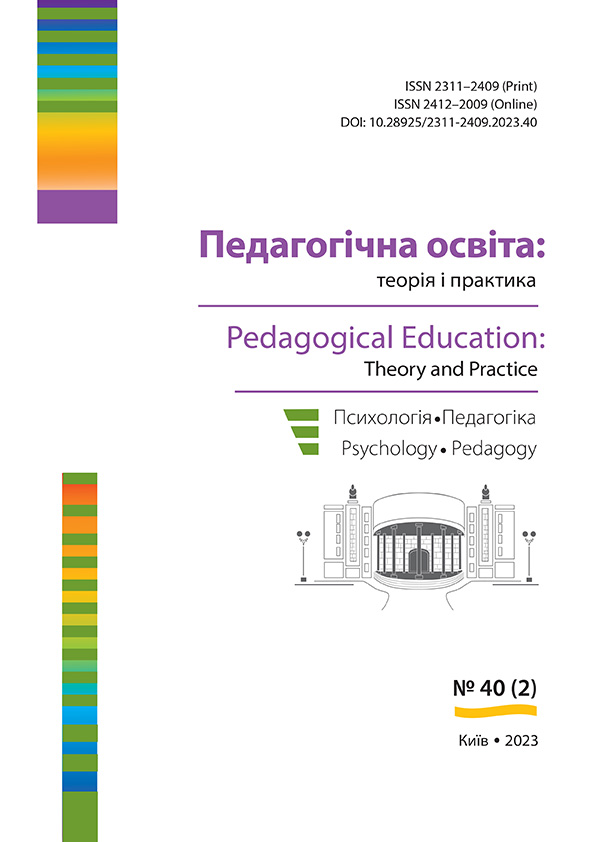Reggio Emilia approach in interaction with young children.
DOI:
https://doi.org/10.28925/2311-2409.2023.404Abstract
The article highlights the unique Reggio-Emilia approach, familiarity with which is important in terms of changes in preschool education in Ukraine in accordance with global educational trends formulated in accordance with general changes in the world (pandemic, war, environmental problems, etc.). The importance of creating conditions for self-expression of children in the educational environment of a preschool education institution with the help of a specially created environment is described. An analytical review of the environmental approach proposed by the Reggio-Emilia approach and the impact of such an environment on the development of a harmonious personality was carried out. Questions were raised regarding the possibility of providing children with sufficient free time in an environment filled with materials. The peculiarities of the implementation of the Reggio-Emilia approach in the structure of the day for young children are outlined: meeting on the piazza and its importance in creating relationships between all children and adults; holding the assembly and its main points; selection of activities and features of their presentation in accordance with previously developed documentation; types of activities in the environment and related facilities. The article highlights the ideas of organizing children's life activities in preschool education institutions of various forms of ownership, which work according to the Reggio-Emilia approach. The analysis of architectural solutions in preschool education institutions that work according to the Regio-Emilia approach was carried out. The importance of realizing the child's self-expression in the personal paradigm in education is argued. The activities that children choose during their free time are characterized: activities without an adult, activities with an adult, the peculiarities of their location in the environment for the sake of interest and deepening the research topic. The main types of documentation are identified, which are important for the formation of activities and offers for children, taking into account the possibility of "self-expression" with the specified activities. The Reggio-Emilia approach is described as one of the progressive and years-proven practice approaches that contribute to the "self-expression" of children. Attention is focused on the importance of essential changes in the creation of the developmental space of preschool institutions of Ukraine, which will contribute to the free choice of children and their "self-expression". Conclusions were made and prospects for further research were determined.
Downloads
References
Державний стандарт дошкільної освіти: особливості впровадження /упоряд.: О.Г.Косенчук,
І.М.Новик, О.А.Венгловська, Л.В.Куземко. Харків: «Ранок», 2021. 240 с.
Дичківська І.М., Поніманська Т.І. М. Монтессорі: теорія і технологія. Київ: Видавничий Дім
«Слово», — 2009. — 304 с.
Гармс Тельма. Шкала оцінювання якості освітнього процесу в закладах дошкільної освіти. Третя
редакція (ECERS — 3)/Тельма Гармс, Річард М. Кліффорд, Деббі Краєр/переклад з англ. О. Тільна.
Харків: Вид. «Ранок», 2020. 116 с.
Bordercrossings: Encounter with Living things Digital landscapes. Reggio Children Pubns, 2018,
pages.
Children, spaces, relations-metaprojects for an environment for young children. Reggio Children Pubns,
, 160 pages.
Making learning visible: children as individual and group learners. Project Zero, Reggio Children.
Reggio Children Pubns, 2001, 368 pages
Derzhavnyi standart doshkilnoi osvity: osoblyvosti vprovadzhennia /uporiad.: O.H.Kosenchuk,
I.M.Novyk, O.A.Venhlovska, L.V.Kuzemko. Kharkiv: «Ranok», 2021. 240 s. [in Ukrainian]
Dychkivska I.M., Ponimanska T.I. M. Montessori: teoriia i tekhnolohiia. Kyiv: Vydavnychyi Dim
«Slovo», 2009. 304 s. [in Ukrainian]
Harms Telma. Shkala otsiniuvannia yakosti osvitnoho protsesu v zakladakh doshkilnoi osvity. Tretia
redaktsiia (ECERS — 3)/Telma Harms, Richard M. Klifford, Debbi Kraier/pereklad z anhl. O. Tilna.
Kharkiv: Vyd. «Ranok», 2020. 116 s. [in Ukrainian]
Bordercrossings: Encounter with Living things Digital landscapes. Reggio Children Pubns, 2018,
pages. [in English]
Children, spaces, relations-metaprojects for an environment for young children. Reggio Children
Pubns, 2008, 160 pages. [in English]
Making learning visible: children as individual and group learners. Project Zero, Reggio Children.
Reggio Children Pubns, 2001, 368 pages [in English]

